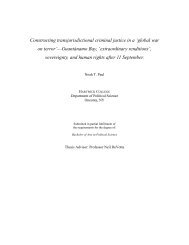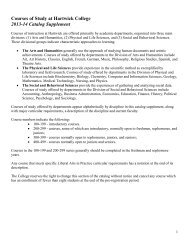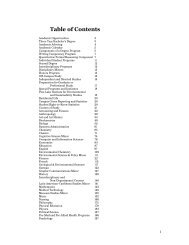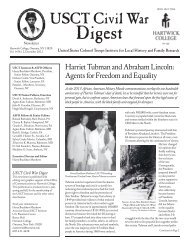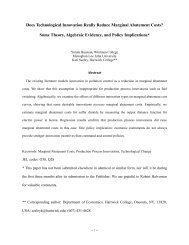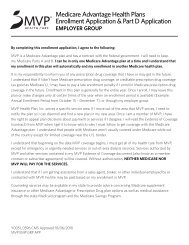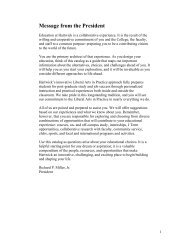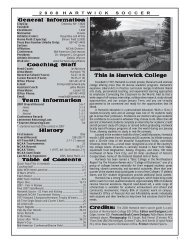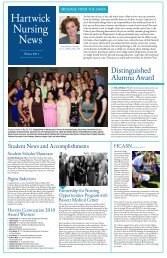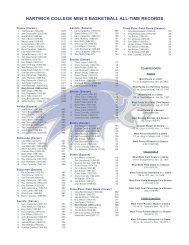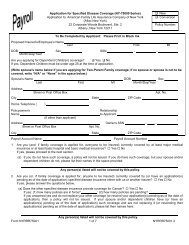Table of Contents - Hartwick College
Table of Contents - Hartwick College
Table of Contents - Hartwick College
You also want an ePaper? Increase the reach of your titles
YUMPU automatically turns print PDFs into web optimized ePapers that Google loves.
in the perspective <strong>of</strong> the world as a system <strong>of</strong> interdependent societies and<br />
states. Prerequisite: Anth 105 or Soci 105. May be taken more than once<br />
for credit. (NTW) or (SBA)<br />
340 Primate Behavior and Ecology (4 credits) Comparative analysis<br />
<strong>of</strong> non-human primates, and application to questions <strong>of</strong> human evolution<br />
and biological bases for human behavior. Primate taxonomy, evolution<br />
and ecology are studied for their relevance to primate behavior and<br />
adaptation. Prerequisite: Anth 105. (SBA)<br />
341 Cultural Ecology (3 credits) Analysis <strong>of</strong> the relationships between<br />
culture and environment: the ways in which populations adapt to and<br />
transform their environments; ways in which environments condition<br />
cultural development. Prerequisite: Anth 105. (NTW) or (SBA)<br />
346 Race and Human Variability (3 credits) Scientific and popular<br />
conceptions <strong>of</strong> “race.” Genetics and adaptation to environmental (and<br />
social) stress, including intense cold and heat, high altitudes and disease.<br />
Survival through natural and cultural selection. Prerequisite: Anth 105.<br />
(SBA)<br />
347 Human Evolution (3 credits) Human biological and cultural<br />
evolution from 5 million to 20,000 years ago: what happened, why, and<br />
what kinds <strong>of</strong> evidence are appropriate and available? A review <strong>of</strong> the<br />
evidence and the interpretations drawn from it. Prerequisite: Anth 105.<br />
(SBA)<br />
348 Anthropology <strong>of</strong> Development (3 credits) The analysis and<br />
interpretation <strong>of</strong> the historical expansion <strong>of</strong> the world economic system<br />
and its cultural foundations. The notion <strong>of</strong> development also is examined<br />
from a variety <strong>of</strong> critical perspectives. The relation <strong>of</strong> development<br />
practices to the problems currently facing the global system such as<br />
environmental degradation, population expansion, Third World debt,<br />
famine, etc., are also explored. This exploration ultimately leads to<br />
questions about whether prevailing notions <strong>of</strong> development have any<br />
relevance in the contemporary world system, particularly for members <strong>of</strong><br />
the underdeveloped world. Prerequisite: Anth 105. (NTW) or (SBA)<br />
350 Topics in Anthropology (credits vary by specific course, 3 to 4<br />
credits) For description see Anth 250. 361 Medical Anthropology (3<br />
credits) Anthropological approach to the study <strong>of</strong> health problems. The<br />
use <strong>of</strong> clinical, ecological, and ethnographic material to study the causes<br />
and effects <strong>of</strong> disease on humans. The impact <strong>of</strong> population growth and<br />
migration; human contact through time and space on societies around the<br />
world. A bridge between the health sciences and anthropology.<br />
Prerequisite: Anth 105. (SBA)<br />
387 Ethnographic Methods (4 credits) Problems, theories and<br />
techniques <strong>of</strong> anthropological fieldwork. Students conduct field studies in<br />
the local area. Methods <strong>of</strong> building rapport with subjects. Data collection,<br />
analysis and interpretation. Cross-cultural comparisons. Class<br />
presentations. Prerequisite: Anth 105.<br />
388 Classics <strong>of</strong> Anthropological Thought (3 credits) The history<br />
and integration <strong>of</strong> anthropological theory as social science. An<br />
introduction to anthropology’s great thinkers; major issues <strong>of</strong> 19 th and<br />
20 th century thought. Required core course for anthropology majors.<br />
Prerequisite: Anth 105, 223 and 237. (SBA)<br />
38



